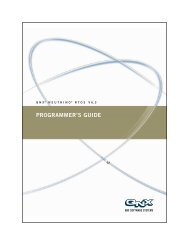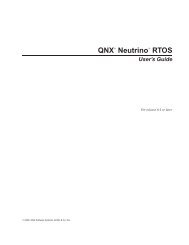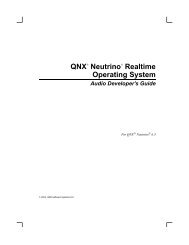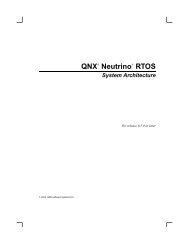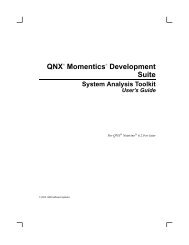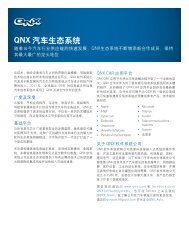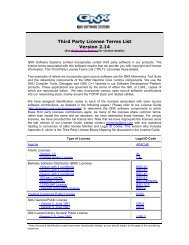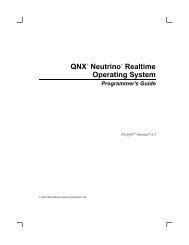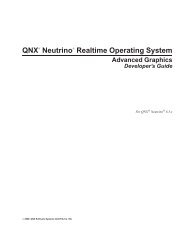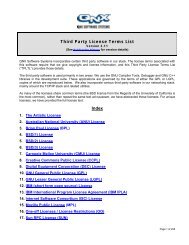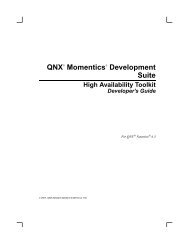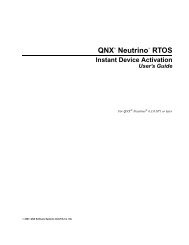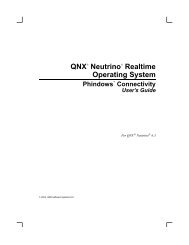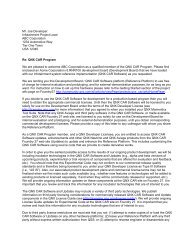- Page 1 and 2: QNX ® Neutrino ® Realtime Operati
- Page 3 and 4: Contents About This Book xv What yo
- Page 5 and 6: © 2012, QNX Software Systems Limit
- Page 7 and 8: © 2012, QNX Software Systems Limit
- Page 9 and 10: © 2012, QNX Software Systems Limit
- Page 11: © 2012, QNX Software Systems Limit
- Page 15: About This Book June 14, 2012 About
- Page 18 and 19: Recommended reading © 2012, QNX So
- Page 21: Chapter 1 Compiling and Debugging I
- Page 24 and 25: Making your code more portable © 2
- Page 26 and 27: Header files in /usr/include © 201
- Page 28 and 29: Self-hosted or cross-development ©
- Page 30 and 31: Self-hosted or cross-development ©
- Page 32 and 33: Using libraries © 2012, QNX Softwa
- Page 34 and 35: Linking your modules © 2012, QNX S
- Page 38 and 39: Optimizing the runtime linker © 20
- Page 40 and 41: Optimizing the runtime linker © 20
- Page 42 and 43: Debugging © 2012, QNX Software Sys
- Page 44 and 45: Debugging © 2012, QNX Software Sys
- Page 46 and 47: Debugging © 2012, QNX Software Sys
- Page 48 and 49: Debugging © 2012, QNX Software Sys
- Page 50 and 51: A simple debug session © 2012, QNX
- Page 52 and 53: A simple debug session © 2012, QNX
- Page 55: Chapter 2 Programming Overview In t
- Page 58 and 59: Process model © 2012, QNX Software
- Page 60 and 61: Priorities and scheduling © 2012,
- Page 62 and 63: Priorities and scheduling © 2012,
- Page 64 and 65: Scheduling policies © 2012, QNX So
- Page 66 and 67: Scheduling policies © 2012, QNX So
- Page 68 and 69: Summary © 2012, QNX Software Syste
- Page 71 and 72: © 2012, QNX Software Systems Limit
- Page 73 and 74: © 2012, QNX Software Systems Limit
- Page 75 and 76: © 2012, QNX Software Systems Limit
- Page 77 and 78: © 2012, QNX Software Systems Limit
- Page 79 and 80: © 2012, QNX Software Systems Limit
- Page 81 and 82: © 2012, QNX Software Systems Limit
- Page 83 and 84: © 2012, QNX Software Systems Limit
- Page 85 and 86: © 2012, QNX Software Systems Limit
- Page 87 and 88:
© 2012, QNX Software Systems Limit
- Page 89 and 90:
© 2012, QNX Software Systems Limit
- Page 91 and 92:
© 2012, QNX Software Systems Limit
- Page 93 and 94:
© 2012, QNX Software Systems Limit
- Page 95 and 96:
© 2012, QNX Software Systems Limit
- Page 97 and 98:
© 2012, QNX Software Systems Limit
- Page 99 and 100:
© 2012, QNX Software Systems Limit
- Page 101 and 102:
© 2012, QNX Software Systems Limit
- Page 103 and 104:
© 2012, QNX Software Systems Limit
- Page 105:
Chapter 4 Tick, Tock: Understanding
- Page 108 and 109:
Oversleeping: errors in delays © 2
- Page 110 and 111:
Another hiccup with hardware timers
- Page 112 and 113:
What time is it? © 2012, QNX Softw
- Page 115:
Chapter 5 Transparent Distributed P
- Page 118 and 119:
Benefits of Qnet © 2012, QNX Softw
- Page 120 and 121:
How does it work? © 2012, QNX Soft
- Page 122 and 123:
Locating services using GNS © 2012
- Page 124 and 125:
Locating services using GNS © 2012
- Page 126 and 127:
Locating services using GNS © 2012
- Page 128 and 129:
Quality of Service (QoS) and multip
- Page 130 and 131:
Designing a system using Qnet © 20
- Page 132 and 133:
Designing a system using Qnet © 20
- Page 134 and 135:
Autodiscovery vs static © 2012, QN
- Page 136 and 137:
When should you use Qnet, TCP/IP, o
- Page 138 and 139:
Drivers for Qnet © 2012, QNX Softw
- Page 141 and 142:
© 2012, QNX Software Systems Limit
- Page 143 and 144:
© 2012, QNX Software Systems Limit
- Page 145 and 146:
© 2012, QNX Software Systems Limit
- Page 147 and 148:
© 2012, QNX Software Systems Limit
- Page 149 and 150:
© 2012, QNX Software Systems Limit
- Page 151 and 152:
© 2012, QNX Software Systems Limit
- Page 153:
Chapter 7 Heap Analysis: Making Mem
- Page 156 and 157:
Dynamic memory management © 2012,
- Page 158 and 159:
Dynamic memory management © 2012,
- Page 160 and 161:
Heap corruption © 2012, QNX Softwa
- Page 162 and 163:
Heap corruption © 2012, QNX Softwa
- Page 164 and 165:
Detecting and reporting errors © 2
- Page 166 and 167:
Detecting and reporting errors © 2
- Page 168 and 169:
Detecting and reporting errors © 2
- Page 170 and 171:
Detecting and reporting errors © 2
- Page 172 and 173:
Detecting and reporting errors © 2
- Page 174 and 175:
Memory leaks © 2012, QNX Software
- Page 176 and 177:
Compiler support © 2012, QNX Softw
- Page 178 and 179:
Compiler support © 2012, QNX Softw
- Page 181 and 182:
© 2012, QNX Software Systems Limit
- Page 183 and 184:
© 2012, QNX Software Systems Limit
- Page 185 and 186:
© 2012, QNX Software Systems Limit
- Page 187 and 188:
© 2012, QNX Software Systems Limit
- Page 189:
Chapter 9 Conventions for Recursive
- Page 192 and 193:
Structure of a multiplatform source
- Page 194 and 195:
Structure of a multiplatform source
- Page 196 and 197:
Specifying options © 2012, QNX Sof
- Page 198 and 199:
Using the standard macros and inclu
- Page 200 and 201:
Using the standard macros and inclu
- Page 202 and 203:
Using the standard macros and inclu
- Page 204 and 205:
Using the standard macros and inclu
- Page 206 and 207:
Advanced topics © 2012, QNX Softwa
- Page 208 and 209:
Advanced topics © 2012, QNX Softwa
- Page 210 and 211:
Examples of creating Makefiles © 2
- Page 212 and 213:
Examples of creating Makefiles © 2
- Page 214 and 215:
Examples of creating Makefiles © 2
- Page 216 and 217:
Examples of creating Makefiles © 2
- Page 219 and 220:
© 2012, QNX Software Systems Limit
- Page 221 and 222:
© 2012, QNX Software Systems Limit
- Page 223 and 224:
© 2012, QNX Software Systems Limit
- Page 225 and 226:
© 2012, QNX Software Systems Limit
- Page 227 and 228:
© 2012, QNX Software Systems Limit
- Page 229 and 230:
© 2012, QNX Software Systems Limit
- Page 231 and 232:
© 2012, QNX Software Systems Limit
- Page 233 and 234:
© 2012, QNX Software Systems Limit
- Page 235 and 236:
© 2012, QNX Software Systems Limit
- Page 237 and 238:
© 2012, QNX Software Systems Limit
- Page 239 and 240:
© 2012, QNX Software Systems Limit
- Page 241 and 242:
© 2012, QNX Software Systems Limit
- Page 243 and 244:
© 2012, QNX Software Systems Limit
- Page 245 and 246:
© 2012, QNX Software Systems Limit
- Page 247 and 248:
© 2012, QNX Software Systems Limit
- Page 249 and 250:
© 2012, QNX Software Systems Limit
- Page 251 and 252:
© 2012, QNX Software Systems Limit
- Page 253 and 254:
© 2012, QNX Software Systems Limit
- Page 255 and 256:
© 2012, QNX Software Systems Limit
- Page 257 and 258:
© 2012, QNX Software Systems Limit
- Page 259 and 260:
© 2012, QNX Software Systems Limit
- Page 261 and 262:
© 2012, QNX Software Systems Limit
- Page 263 and 264:
© 2012, QNX Software Systems Limit
- Page 265 and 266:
© 2012, QNX Software Systems Limit
- Page 267 and 268:
© 2012, QNX Software Systems Limit
- Page 269 and 270:
© 2012, QNX Software Systems Limit
- Page 271:
Appendix B Using GDB In this append
- Page 274 and 275:
GDB commands © 2012, QNX Software
- Page 276 and 277:
GDB commands © 2012, QNX Software
- Page 278 and 279:
Running programs under GDB © 2012,
- Page 280 and 281:
Running programs under GDB © 2012,
- Page 282 and 283:
Running programs under GDB © 2012,
- Page 284 and 285:
Running programs under GDB © 2012,
- Page 286 and 287:
Stopping and continuing © 2012, QN
- Page 288 and 289:
Stopping and continuing © 2012, QN
- Page 290 and 291:
Stopping and continuing © 2012, QN
- Page 292 and 293:
Stopping and continuing © 2012, QN
- Page 294 and 295:
Stopping and continuing © 2012, QN
- Page 296 and 297:
Stopping and continuing © 2012, QN
- Page 298 and 299:
Stopping and continuing © 2012, QN
- Page 300 and 301:
Stopping and continuing © 2012, QN
- Page 302 and 303:
Examining the stack © 2012, QNX So
- Page 304 and 305:
Examining the stack © 2012, QNX So
- Page 306 and 307:
Examining source files © 2012, QNX
- Page 308 and 309:
Examining source files © 2012, QNX
- Page 310 and 311:
Examining source files © 2012, QNX
- Page 312 and 313:
Examining data © 2012, QNX Softwar
- Page 314 and 315:
Examining data © 2012, QNX Softwar
- Page 316 and 317:
Examining data © 2012, QNX Softwar
- Page 318 and 319:
Examining data © 2012, QNX Softwar
- Page 320 and 321:
Examining data © 2012, QNX Softwar
- Page 322 and 323:
Examining data © 2012, QNX Softwar
- Page 324 and 325:
Examining data © 2012, QNX Softwar
- Page 326 and 327:
Examining data © 2012, QNX Softwar
- Page 328 and 329:
Examining the symbol table © 2012,
- Page 330 and 331:
Altering execution © 2012, QNX Sof
- Page 332 and 333:
Altering execution © 2012, QNX Sof
- Page 335:
Appendix C ARM Memory Management In
- Page 338 and 339:
ARM-specific restrictions and issue
- Page 340 and 341:
ARM-specific features © 2012, QNX
- Page 342 and 343:
ARM-specific features © 2012, QNX
- Page 345 and 346:
© 2012, QNX Software Systems Limit
- Page 347 and 348:
© 2012, QNX Software Systems Limit
- Page 349 and 350:
© 2012, QNX Software Systems Limit
- Page 351 and 352:
© 2012, QNX Software Systems Limit
- Page 353 and 354:
© 2012, QNX Software Systems Limit
- Page 355:
© 2012, QNX Software Systems Limit
- Page 359 and 360:
© 2012, QNX Software Systems Limit
- Page 361 and 362:
© 2012, QNX Software Systems Limit
- Page 363 and 364:
© 2012, QNX Software Systems Limit
- Page 365 and 366:
© 2012, QNX Software Systems Limit
- Page 367 and 368:
© 2012, QNX Software Systems Limit
- Page 369 and 370:
© 2012, QNX Software Systems Limit
- Page 371 and 372:
© 2012, QNX Software Systems Limit
- Page 373 and 374:
© 2012, QNX Software Systems Limit
- Page 375:
© 2012, QNX Software Systems Limit
- Page 378 and 379:
Index © 2012, QNX Software Systems
- Page 380 and 381:
Index © 2012, QNX Software Systems
- Page 382 and 383:
Index © 2012, QNX Software Systems
- Page 384 and 385:
Index © 2012, QNX Software Systems
- Page 386 and 387:
Index © 2012, QNX Software Systems
- Page 388 and 389:
Index © 2012, QNX Software Systems
- Page 390 and 391:
Index © 2012, QNX Software Systems
- Page 392 and 393:
Index © 2012, QNX Software Systems
- Page 394 and 395:
Index © 2012, QNX Software Systems
- Page 396 and 397:
Index © 2012, QNX Software Systems
- Page 398 and 399:
Index © 2012, QNX Software Systems
- Page 400 and 401:
Index © 2012, QNX Software Systems


![QNX Neutrino Programmer's Guide [6.5.0 SP1] - QNX Software ...](https://img.yumpu.com/25613232/37/500x640/qnx-neutrino-programmers-guide-650-sp1-qnx-software-.jpg)
